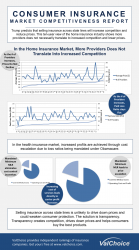Cheap insurance is attractive to everyone, except insurance companies. Other than Obamacare, the federal government has stayed on the sidelines when it comes to insurance for the last 70 years. Donald Trump may change that. He’s already putting the insurance industry on notice that he plans to change the way insurance is sold. What Trump doesn’t know is that letting companies sell across state lines is unlikely to change the competitive dynamic of the industry. As a result, Trump’s proposal is not likely to drive down prices or help consumers. Download the ValChoice report Fact Checking Donald Trump on Insurance for the details on why this is the case.
Selling across state lines differs from current law where insurance is regulated by each state and insurance companies must be licensed in each state where they do business. Trumps’ plan is a form of deregulation, eliminating the need for licensing in each individual state. The anticipated consumer benefit of this plan is cheap insurance. However, the plan makes signifiant assumptions. Below we address the three major assumptions behind the plan.
To have interesting ValChoice content delivered directly to you, subscribe to our newsletter.
Assumption 1: Selling Across State Lines Will Increase Competition
At best, this assumption is questionable. The insurance industry is comprised of companies that already sell in every state as well as companies that sell regionally. Regional companies do not sell in every state by choice, not because state regulators won’t allow them to sell in the state. Therefore, not requiring licensing on a state-by-state basis will not create additional competition. Only if there are companies currently excluded from the market that would be allowed to enter would additional competition be created.
Assumption 2: Increased Competition Will Drive Down Prices and Result in Cheap Insurance
A study by ValChoice shows there is not necessarily a correlation between more competitors and either lower prices or higher loss ratios in the insurance markets. The report titled Fact Checking Donald Trump on Insurance is available on the ValChoice website.
Assumption 3: Trump’s Plan Will Not Impact Consumer Protection
The federal government has no role in the protection of consumers of insurance. All consumer protection matters are handled by the states. Allowing insurance companies to domicile and operate from remote states could lead to a concentration of insurance companies in the states with the weakest consumer protection laws. This in turn could lead to consumers losing protections they currently enjoy. Scenarios where consumers are forced to fight lawsuits (an already difficult method for recovering loss compensation) in remote states where insurance companies have the home court advantage are a possibility.
A Better Plan for Helping Consumers Get Cheap Insurance
It’s good that Trump is thinking about how to help American families find cheap insurance. Health and home insurance costs are escalating at a pace much faster than the cost of living. Consequently, insurance is a contributing factor to the steady decline in the standard of living among Americans.
Competition is the right approach to driving down costs. However, selling across state lines will not create the needed competitive dynamics. The answer instead is transparency. Information about how insurance companies spend money and treat consumers that file claims is the answer. Selling across state lines could be part and parcel of this plan, but would require significant modifications to how insurance is regulated in the U.S.
For more information on Trump’s plan on insurance, visit the website On The Issues.


No comments yet.